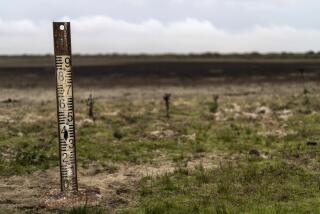EC May Soon Recognize Separatist Yugoslav States
- Share via
BRUSSELS — The 12 nations of the European Community agreed early today to confer diplomatic recognition on Jan. 15 to all republics in civil war-torn Yugoslavia that meet a series of conditions, including respect for human rights and peaceful acceptance of borders.
EC foreign ministers, in a meeting that began Monday morning and lasted past midnight here, gave Yugoslavia’s six republics until next Monday to apply for diplomatic recognition.
Meantime, the EC leaders said they hope that the United Nations will deploy peacekeeping forces in Yugoslavia. U.N. Secretary General Javier Perez de Cuellar had warned in a letter to the EC that “selective and untimely recognition” of Yugoslav republics would only escalate the civil war.
“We continue to attach the greatest importance to the deployment of a U.N. peacekeeping force,” Dutch Foreign Minister Hans van den Broek said in announcing the EC’s decision.
He and other EC officials said they hope the prospect of diplomatic recognition will put pressure on Serbia, the Yugoslav republic widely viewed in Europe as the villain of the civil war, to halt its aggression against Croatia and Slovenia, which declared their independence from Yugoslavia in June.
But they could not say what Serbia would now gain from a cease-fire. Serbia has asserted that it is fighting the breakaway republic of Croatia to protect ethnic Serbs living there from feared discrimination and attacks by ethnic Croats.
The outcome of Monday’s meeting represented a compromise between Germany, which proposed immediate recognition of Croatia and Slovenia, and several other EC nations, which shared Perez de Cuellar’s concerns that recognition would make matters worse.
The Germans could say the EC decision immediately put Croatia and Slovenia on the road to diplomatic recognition by all 12 EC nations. But at the same time, British Foreign Secretary Douglas Hurd, who resisted immediate recognition, called the outcome an “exceptional compromise.”
Because the EC decision was reached so late, there was little immediate reaction from European sources, especially leaders of the Yugoslav republics. But Serbian officials over the weekend had warned they would take unspecified “countermeasures” to any recognition of Croatia and Slovenia.
Croatia and Slovenia were widely expected to apply to the EC for recognition. Van den Broek said he did not know whether to expect Serbia to apply.
He said he would ask Lord Carrington, a former British foreign secretary who is chairman of the EC’s largely dormant Yugoslav peace conference, to use his influence on the “non-cooperative party” to respect U.N. peacekeeping forces as they are deployed in Yugoslavia. The civil war’s chief combatants are Croats on one side and Serbs and the Serbian-dominated federal army on the other.
Carrington reportedly warned the foreign ministers during Monday’s meeting that prompt diplomatic recognition of Croatia and Slovenia would effectively end the EC peace process and possibly lead to intensified attacks against Croatia by Serbia, which already controls about one-third of Croatia’s territory.
President Bush over the weekend also had urged Western leaders to adopt a cautious approach toward recognition of Croatia and Slovenia.
Van den Broek said applications for diplomatic recognition would be reviewed by an arbitration commission that is part of the EC peace conference.
The conditions for diplomatic recognition are that the republics respect: the rule of law, democratic processes and human rights; the rights of minorities and ethnic groups; and national boundaries determined by peaceful means. They also must accept arms control and nuclear non-proliferation agreements that have been entered into by Yugoslavia and make a firm commitment to settle regional disputes peacefully, with resort to arbitration if necessary.
The five conditions were proposed by France, with Germany’s co-sponsorship, to apply to breakaway republics not only in Yugoslavia but also in the splintering Soviet Union.
During Monday’s meeting, German Foreign Minister Hans-Dietrich Genscher reportedly argued that eight months of diplomacy, three of them including Carrington’s EC peace conference, had failed to bring peace between Yugoslavia’s warring parties. A succession of cease-fires, he said, were violated practically as soon as they took effect.
French Foreign Minister Roland Dumas told reporters that Belgium and Denmark initially lined up with the Germans. The other nine EC nations wanted to wait, Dumas said, with France and the Netherlands, which holds the rotating EC presidency, suggesting Jan. 15. That was the date that was ultimately accepted, with the added deadline of next Monday for application for diplomatic recognition.
“Everybody agrees that independence of the six republics is inevitable,” said a Dutch diplomatic source when the meeting broke for dinner. “The only question is when.”
Hurd reportedly told his EC counterparts that the United Nations needed time to deploy peacekeeping forces throughout Yugoslavia. He called the world body the “best available hope” for bringing the bloodshed in Yugoslavia to an end, sources in the meeting said.
EC sources said the Yugoslav federal army had pledged to withdraw from Croatia if U.N. peacekeeping troops were deployed. Asked why he expected such an outcome, one EC diplomat said, “We’re born optimists.”
But they offered no such guarantees that Serbian irregulars, which have been in the vanguard of the fighting, would withdraw.
EC officials also expressed concern that the civil war in Yugoslavia would spread to Bosnia-Herzegovina, whose population is one-third ethnic Serbian, if Bosnia sought diplomatic recognition as an independent nation.
More to Read
Sign up for Essential California
The most important California stories and recommendations in your inbox every morning.
You may occasionally receive promotional content from the Los Angeles Times.













